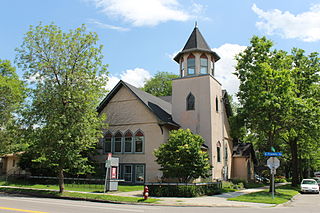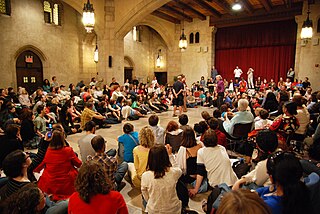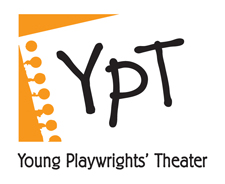Notable dramatic readers
- Edward Brigham
- Gay MacLaren
- Jenniebelle Neal
- Elizabeth Martina Taber
A stage reading, also known as a staged reading, is a form of theatre without sets or full costumes. [1] The actors, who read from scripts, may be seated, stand in fixed positions, or incorporate minimal stage movement.
There is an overlap with the term play reading, [2] One US source says that play reading incorporates little or no movement, while the latter is performed, with actions, on a stage. [3]
A stage reading of a new play in development is an intermediate phase between a cold reading, with the cast usually sitting around a table, and a full production. A narrator may read stage directions aloud. The purpose is to gauge the effectiveness of the dialogue, pacing and flow, and other dramatic elements that the playwright or director may wish to adjust. Audience feedback contributes to the process. [4] In play-development workshopping, the stage reading is one of the forms of workshop, along with the rehearsed reading, the exploratory workshop, and the full workshop production. [5] It is an inexpensive way to get a new play in front of an audience. [6]
Stage readings that include members of Actors' Equity (U.S.) in the cast are governed by that union's Stage Reading Guidelines. [7]
A screenplay in development that relies to a significant degree on dialogue rather than action may sometimes be given a stage reading, as a way to attract potential investors or to rehearse. As a form of public performance, the stage reading of a film script is like performing a radio play before a live audience, with emphasis on the use of imagination and on voice acting, which might require theatre actors and voice-over artists. [8]
Reader's theatre is the stage reading of a fully developed or classic play, when the reading is itself the performance. [9]

The following outline is provided as an overview of and topical guide to theatre:
A teleplay is a screenplay or script used in the production of a scripted television program or series. In general usage, the term is most commonly seen in reference to a standalone production, such as a television film, a television play, or an episode of an anthology series. In internal industry usage, however, all television scripts are teleplays, although a "teleplay by" credit may be classified into a "written by" credit depending on the circumstances of its creation.

Theatrical cold reading is reading aloud from a script or other text with little or no rehearsal, practice or study in advance. Sometimes also referred to as sight reading, it is a technique used by actors and other performers in theatre, television, and film performance fields.
Filmmaking or film production is the process by which a motion picture is produced. Filmmaking involves a number of complex and discrete stages, starting with an initial story, idea, or commission. It then continues through screenwriting, casting, pre-production, shooting, sound recording, post-production, and screening the finished product before an audience that may result in a film release and an exhibition. Filmmaking occurs in a variety of economic, social, and political contexts around the world. It uses a variety of technologies and cinematic techniques.

The read-through, table-read, or table work is a stage of film, television, radio, and theatre production when an organized reading of the screenplay or script is conducted around a table by the actors with speaking parts.

Screenwriting or scriptwriting is the art and craft of writing scripts for mass media such as feature films, television productions or video games. It is often a freelance profession.

In the performing arts industry such as theatre, film, or television, casting, or a casting call, is a pre-production process for selecting a certain type of actor, dancer, singer, or extra for a particular role or part in a script, screenplay, or teleplay. This process may be used for a motion picture, television program, documentary film, music video, play, or advertisement, intended for an audience.

South Coast Repertory (SCR) is a professional theatre company located in Costa Mesa, California.

The Playwrights' Center is a non-profit theatre organization focused on both supporting playwrights and promoting new plays to production at theaters across the country. It is located in the Seward neighborhood of Minneapolis, Minnesota. In October of 2020, the organization announced plans to move to a larger space in St. Paul.

The Theatre of the Oppressed (TO) describes theatrical forms that the Brazilian theatre practitioner Augusto Boal first elaborated in the 1970s, initially in Brazil and later in Europe. Boal was influenced by the work of the educator and theorist Paulo Freire and his book Pedagogy of the Oppressed. Boal's techniques use theatre as means of promoting social and political change in alignment originally with radical-left politics and later with centre-left ideology. In the Theatre of the Oppressed, the audience becomes active, such that as "spect-actors" they explore, show, analyse and transform the reality in which they are living.
The Theatre Development Fund (TDF) is a non-profit corporation dedicated to assisting the theatre industry in New York City. Created in 1968 to help an ailing New York theatre industry, TDF has grown into the nation's largest performing arts nonprofit, providing support to more than 900 plays and musicals and returning upwards of $1.5 billion in revenue to thousands of Broadway, Off-Broadway and Off-Off-Broadway music and dance productions.

Young Playwrights' Theater (YPT) is a not-for-profit theater arts-based education organization in Northwest Washington, D.C. It provides interactive in-school and after-school programs presenting and discussing student-written work to promote community dialogue and respect for young artists.

New Play Project is a non-profit organization founded in Provo, Utah, by four Brigham Young University students. NPP is dedicated to writing and producing new plays that reflect the standards of a Utah Valley audience. They also aim to give emerging Latter-day Saint writers a place to produce their work while maintaining their standards and values. It primarily produces short play festivals, but occasionally takes on larger projects. It is the first such organization to flourish in the area, and has produced more than 70 original plays since its inception in 2006.
The Asian American Theater Company(AATC) is a non-profit theatre performance company based in San Francisco. Its stated mission is "To connect people to Asian American culture through theatre".
Corner Theatre E.T.C. was an experimental theater located in Baltimore, Maryland, existing from 1968 to 1987 as a nonprofit cultural organization.

A play is a work of drama, usually consisting mostly of dialogue between characters and intended for theatrical performance rather than just reading. The writer of a play is called a playwright.
Shekinah Jacob (Auckland) is a playwright based in New Zealand who trained with the Royal Court Theatre, London. Her plays include Ali.J, The Long Way Home produced by Evam Entertainment, the musical Queen of Hearts that toured India and the Middle East, and a monologue titled We are Water on BBC radio. Ali.J, which opened at the Fringe festival in Edinburgh received a four-star review from The Scotsman. Her latest play Kitchdi Tales was developed in Melbourne and was shortlisted for the Auckland Arts Festival. Jacob holds a Masters in Writing for Performance from the University of London as a Charles Wallace scholar, and a PhD in theatre from the University of Victoria.

The 24:7 Theatre Festival was an annual event in Manchester, United Kingdom, specializing in showcasing new writing talent from across the North West. It was founded in 2004 by David Slack and Amanda Hennessey, and continued annually until 2015, with patrons including the actors Robert Powell, John Henshaw, David Fleeshman and Sue Jenkins. The festival had also attracted financial backing from Arts Council England, Manchester City Council, Manchester Airport and The Co-Operative.
Chris Tugwell is an Australian dramatist, screenwriter and author of English descent. Best known as a playwright, his most successful play was X-Ray, which he also produced. He was originally a dancer and actor, performing with some of Australia's most prominent Theatre-in-Education companies, before turning to writing full-time. Tugwell is also a teacher of screenwriting and the author of the textbook Dinosaur Theory.
The Bruntwood Prize for Playwriting is a British competition for playwriting, the largest of its kind in Europe—in 2019 it received 2561 entries. Since its inception in 2005, more than 15,000 scripts have been entered, £304,000 has been awarded to 34 prize-winning writers, and 24 winning productions have been staged in 38 UK-wide venues. In 2015 the prize celebrated its 10th anniversary and is now recognised as a launch-pad for some of the country's most respected and produced playwrights. The Prize is awarded to scripts that are original and unperformed. The award is a joint venture between the property company Bruntwood and the Royal Exchange Theatre in Manchester the Prize is an opportunity for writers of any background and experience to enter unperformed plays to be judged by a panel of industry experts for a chance to win part of a prize fund totalling £40,000.